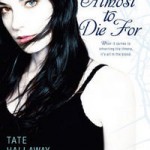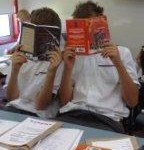Why teens like dystopian novels
 Author Scott Westerfeld (‘Midnighters’ series, ‘Uglies’, ‘Pretties’ etc.)recently wrote a blog about why he thinks teenage readers relate to dystopian fiction [such as ‘The Hunger Games’]. Here’s an excerpt from that blog:
Author Scott Westerfeld (‘Midnighters’ series, ‘Uglies’, ‘Pretties’ etc.)recently wrote a blog about why he thinks teenage readers relate to dystopian fiction [such as ‘The Hunger Games’]. Here’s an excerpt from that blog:
Literary dystopias flourish at the extremes of social control: the tyranny of too much government, the chaos of too little. Every 1984 or Fahrenheit 451 is balanced by a Mad Max or A Clockwork Orange. Or to put it simply, dystopian literature is just like high school: an oscillation between extremes of restraint.
Teenagers, of course, read dystopian novels in vast numbers. (As I write, Suzanne Collins’ post apocalyptic dictatorship novel, Hunger Games, has entered its eighty-first week atop the NY Times Chapter Book list.) This should surprise no one. Within school walls, students have reduced expectations of privacy (New Kersey v. TLO, 1980), no freedom of the press (Hazelwood v. Kuhlmeier, 1983), and their daily reality includes clothing restrictions, rising and sitting at the command of ringing bells, and an ever-increasing amount of electronic surveillance. But a few footsteps away from these 1984-like subjugations, the teenage world becomes Mad Max—warring tribes, dangerous driving, and unfortunate haircuts.
Teenagers’ lives are defined by rules, and in response they construct their identities through confrontations with authority, large and small. All this leaves teens highly interested in issues of control.
Read more on Scott Westerfeld’s blog, or on his Goodreads site here.




 It’s show time in Queensland, which of course means Show Bags!
It’s show time in Queensland, which of course means Show Bags! Do we judge a book by its cover? Often we do! A book cover can be a visual feast of hooks to get us to open up and join in the adventure…or if it does not market the book well, that incredible adventure may just be passed over.
Do we judge a book by its cover? Often we do! A book cover can be a visual feast of hooks to get us to open up and join in the adventure…or if it does not market the book well, that incredible adventure may just be passed over.